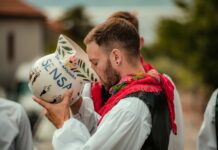These seas were sailed by ancient Greeks erewhile,
by Neretvans ere banished to exile.
On good wine they imbibed must stand the blame
for giving our cove such lovely name.
Long gone are Greeks but their name stands still;
Yet we drink good wine here, and always will.
The verses by venerated Istrian writer Mate Balota depict his beloved bay of Kalavojna under Rakalj. The cove was not just a passing inspiration to him, a motif from rural life on frugal rocky land. It was his life destination, a place from which he gladly went on fishing trips and where he would sit at the hearth in an old stone house of the Saulig family with a glass of good wine — Kalavojna comes from the in ancient Greek term for good wine — and rest his eyes on the sight of Cape Ubac on the opposite side of the Bay of Raška.
Formerly a family home, today it is a mansion above beautiful stone beaches, which are no longer just a hideaway for local fishermen but also attract increasing numbers of tourists. It bears witness to the past. The house attracts the eye of sailing tourists who cruise the remote bays on the eastern Istrian coast in search of the ideal beach. Who would not want to spend part of the summer here? From the house, stone steps lead to the rocky shore and the crystal clear sea.

In addition to offering accommodation at an attractive location, the house also has a rich past. Owner Onorina Nikolić and her brother Romano Saulig, descendants of a family that once lived here, recall the childhood spent in Kalavojna in detail.
The house also has a rich past
Onorina shows us every corner of the old summer house. Old fishing tools decorate every corner of the living area. Not to mention the old hearth… For every item, and there are many, we get a comprehensive explanation. A raised stone frame covered by a wooden board catches the eye.
 — It’s the oldest šterna (water cistern) of this house. It was there when the building was requisitioned by the Austro-Hungarian army. I do not know exactly when the oldest part of the house was built. All I know is that my great-grandfather Ivan purchased it with the surrounding land when he moved here from Friuli with his son, my grandfather Joseph. It was the first half of the 19th century. My grandfather later married my grandmother Fuma Krelja of Rakalj and had seven children with her. As the family grew, the house was expanded by their sons. Three more houses were built as extensions to the existing one. This is where our family stayed the longest, until the early 1950s, when we moved to Pula. After that, we would only stay here in the summer, recounts Romano.
— It’s the oldest šterna (water cistern) of this house. It was there when the building was requisitioned by the Austro-Hungarian army. I do not know exactly when the oldest part of the house was built. All I know is that my great-grandfather Ivan purchased it with the surrounding land when he moved here from Friuli with his son, my grandfather Joseph. It was the first half of the 19th century. My grandfather later married my grandmother Fuma Krelja of Rakalj and had seven children with her. As the family grew, the house was expanded by their sons. Three more houses were built as extensions to the existing one. This is where our family stayed the longest, until the early 1950s, when we moved to Pula. After that, we would only stay here in the summer, recounts Romano.
There used to be a roadside tavern as part of the house
Romano’s grandmother ran a tavern in the house in the late 19th and early 20th century. At the time, Greek sailors were regular visitors to Kalavojna and its good wine.
Only an old corkscrew, which Onorina and her hu sband Zvonko found when they first renovated the house, recalls the old days. Back then, Kalavojna was also a hangout for people of Rakalj, who would occasionally throw bocce in the Sauligs’ courtyard. Where the old zog court used to be is now a well-kept courtyard. Sitting on the stone benches in the shade of the grape vine, with the aromas of cypress, rosemary and oleander, it is difficult to resist the attraction of the view on the Bay of Raša, and decide to get up and return to the city bustle.
sband Zvonko found when they first renovated the house, recalls the old days. Back then, Kalavojna was also a hangout for people of Rakalj, who would occasionally throw bocce in the Sauligs’ courtyard. Where the old zog court used to be is now a well-kept courtyard. Sitting on the stone benches in the shade of the grape vine, with the aromas of cypress, rosemary and oleander, it is difficult to resist the attraction of the view on the Bay of Raša, and decide to get up and return to the city bustle.









